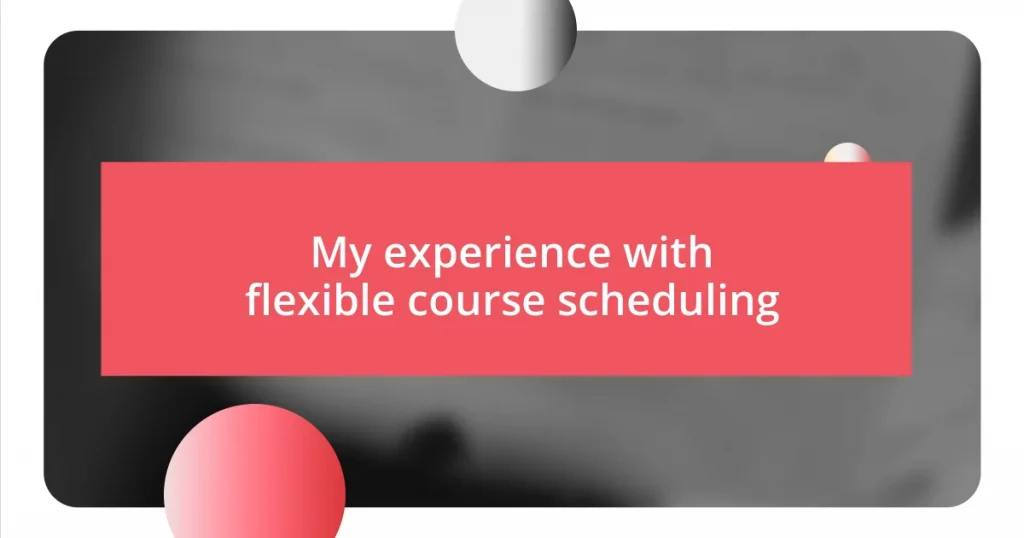Key takeaways:
- The introduction of flexible course scheduling significantly improved time management, leading to better academic performance and reduced stress.
- Personal challenges included learning to set boundaries, coping with anxiety, and adjusting to the freedom of a flexible schedule.
- Effective strategies for maximizing learning outcomes included aligning study sessions with energy levels, actively engaging with the material, and incorporating breaks to enhance retention.
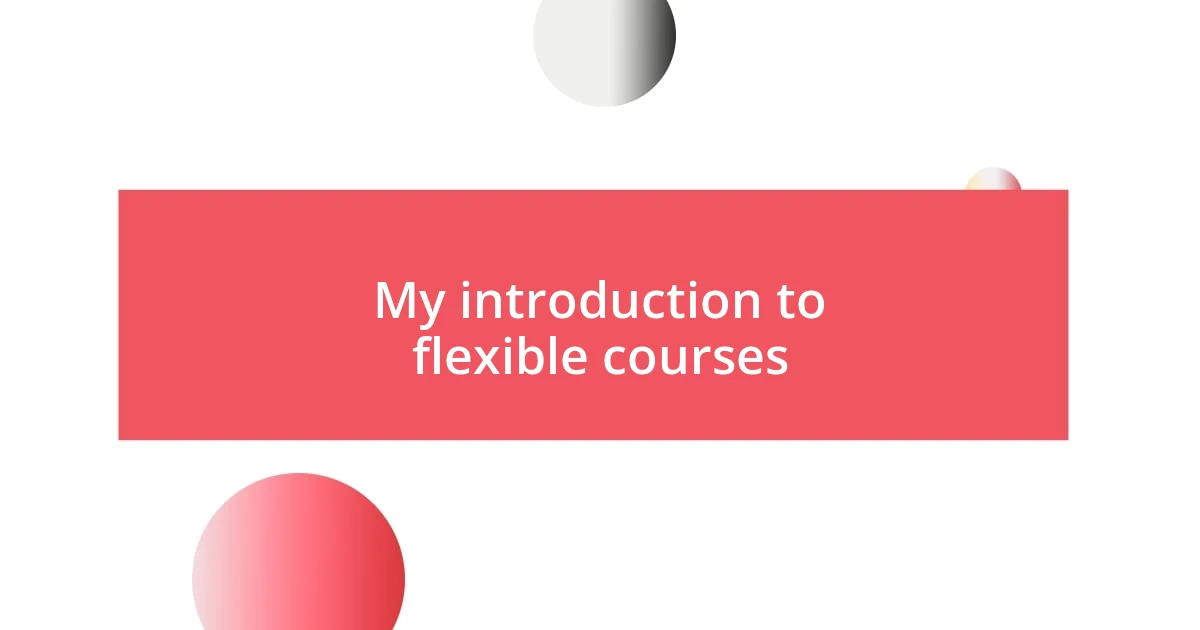
My introduction to flexible courses
I remember the moment I first stumbled upon the concept of flexible course scheduling; it felt like a breath of fresh air. Juggling work and personal commitments while trying to pursue my education had always stressed me out. When I learned that I could select classes based on my availability rather than a rigid timetable, I couldn’t help but wonder how this new approach would transform my experience.
As I dove deeper into flexible courses, I found myself reflecting on how traditional schedules had often left me feeling overwhelmed. Could this newfound freedom empower me to engage more deeply with the material? I quickly realized that being able to customize my learning schedule meant I could take courses when I was most alert and enthusiastic, which significantly boosted my motivation.
It was a game-changer for me. I distinctly recall signing up for a course that started late in the day. It allowed me the morning to prepare and reclaim the energy I needed to absorb the lessons fully. This adjustment not only improved my grades but also rekindled my passion for learning. Have you ever experienced a similar shift in your educational journey?
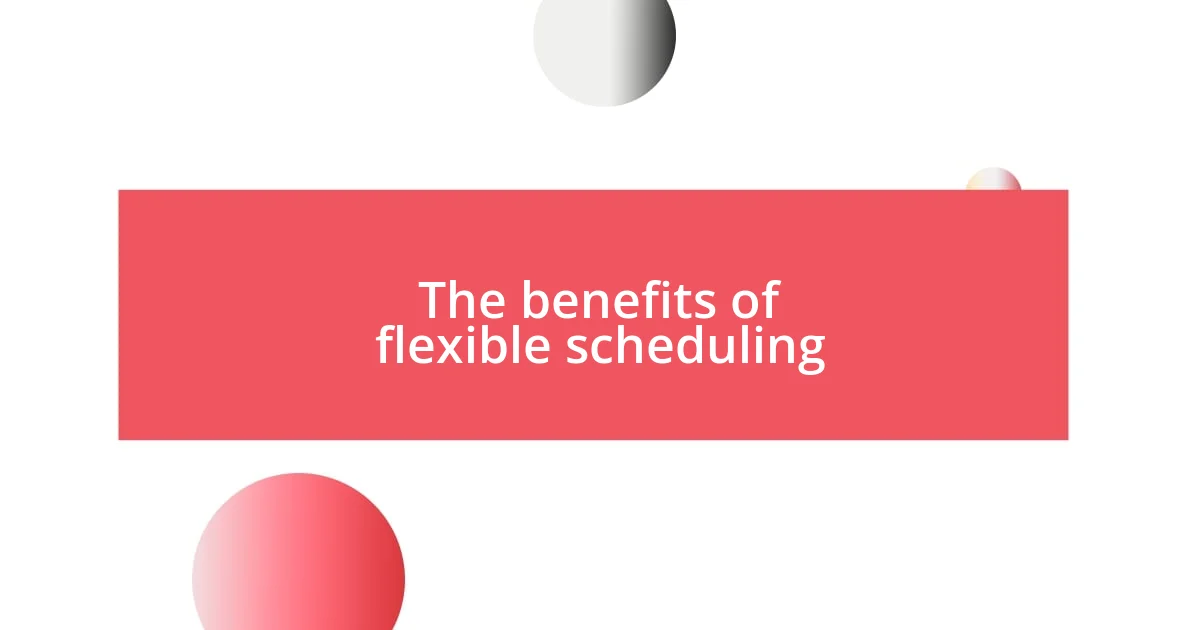
The benefits of flexible scheduling
The benefits of flexible scheduling are numerous and deeply impactful. Personally, I discovered that this adaptable approach drastically improved my time management skills. Instead of adhering to a predetermined schedule, I had the freedom to allocate my study hours when I felt most productive. This customization allowed me to concentrate on my coursework during peak hours, ultimately enhancing my overall academic performance.
Another striking advantage is the balance it fosters between education and personal life. Once, I had a family commitment that coincided with a traditional class time, causing significant stress. However, with flexible scheduling, I was able to adjust my classes to fit my needs without sacrificing precious time with loved ones. This harmonious balance not only alleviated stress but also enriched my social life, making me a more engaged and well-rounded individual.
Moreover, flexible scheduling empowered me to explore newfound interests. There was a time when I took an elective course in creative writing that I had long had a passion for, but my rigid previous schedule never allowed for it. The ability to fit this class into my curriculum opened up a world of creativity, allowing me to express myself in ways I never anticipated. These experiences have made me a firm believer in the power of flexibility in education.
| Benefit | Personal Impact |
|---|---|
| Improved Time Management | Enhanced academic performance by studying at peak times. |
| Better Work-Life Balance | Reduced stress by allowing time for personal commitments. |
| Opportunity for Exploration | Enabled me to pursue creative interests and enrich my learning experience. |
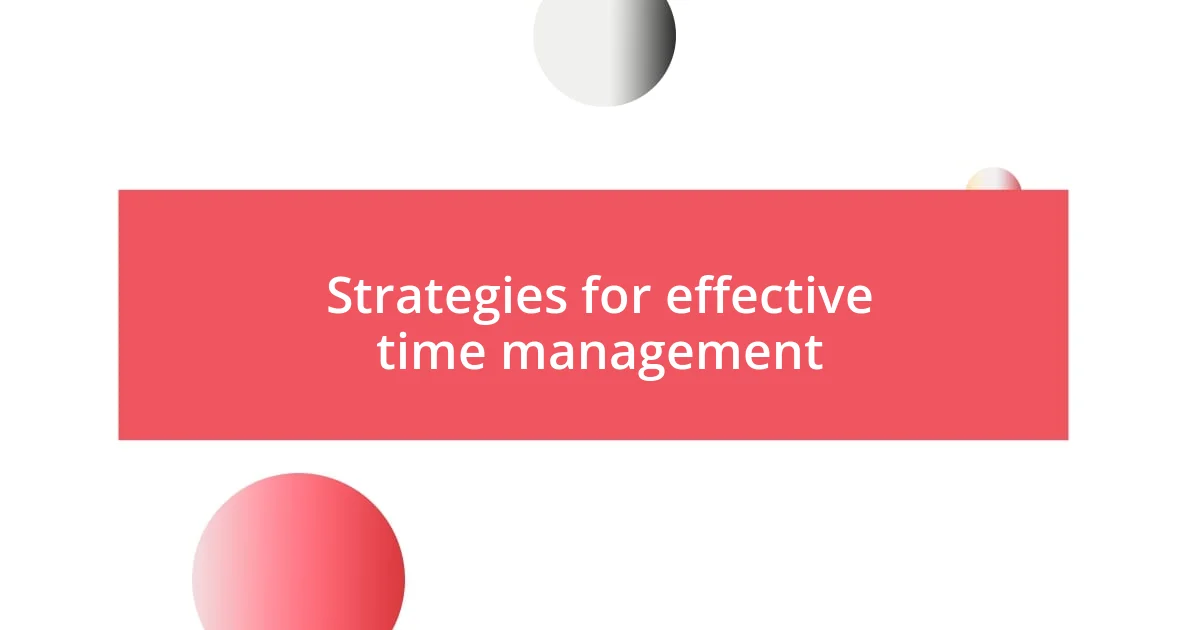
Strategies for effective time management
Managing time effectively in a flexible course scheduling format can truly transform the learning experience. I found that setting clear goals at the start of each week made a world of difference. I would jot down what I aimed to accomplish and allocate specific time blocks for studying, which became my roadmap for success. This method not only helped me stay organized but also created a sense of accomplishment when I crossed tasks off my list, making the study sessions feel rewarding rather than burdensome.
Here are a few strategies that worked wonders for me:
- Prioritize Tasks: Identify the most critical assignments and tackle them first. It felt refreshing to get the tougher tasks out of the way early on.
- Use a Planner: I utilized both digital and paper planners to track deadlines and class schedules, helping me visualize my week.
- Set Time Limits: I established specific durations for study sessions; using a timer transformed my focus and minimized distractions. It was almost like a challenge to complete tasks within a set timeframe.
Time management in a flexible course schedule is all about finding what resonates with you and adapting it to fit your unique rhythm. During one particularly busy week, I dedicated Sunday evenings to reviewing what I had learned and planning for the upcoming week. I discovered that this practice not only aided retention but also allowed me to approach each new class with confidence, feeling truly prepared for what lay ahead.
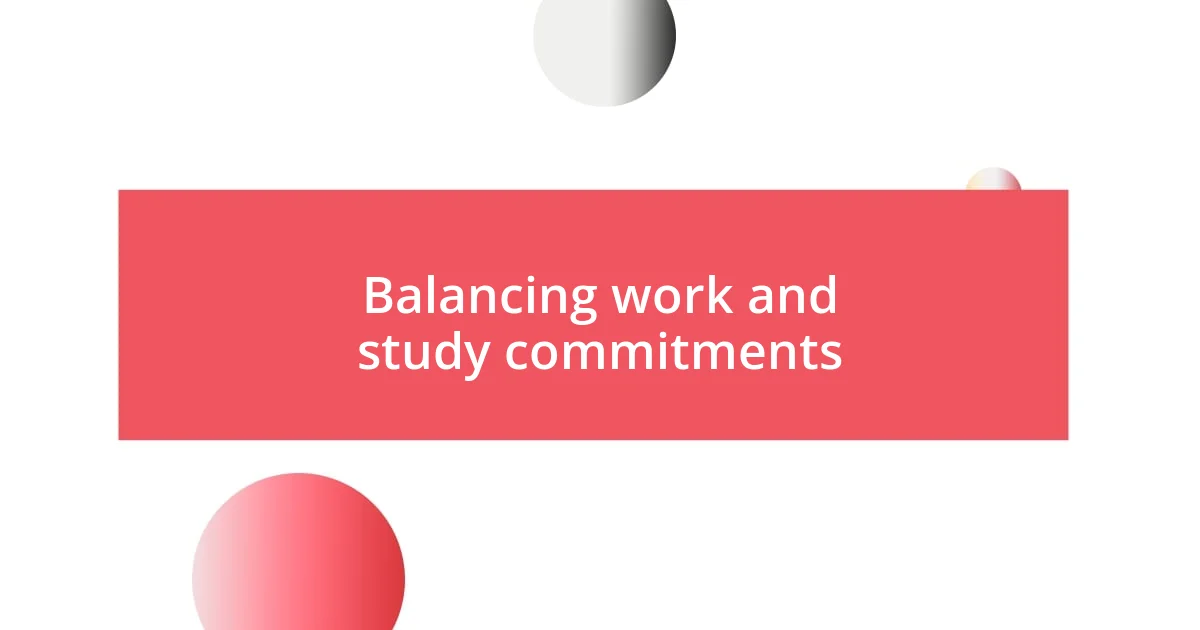
Balancing work and study commitments
Balancing work and study commitments is a delicate dance that can feel overwhelming at times. I remember grappling with late-night shifts while trying to keep up with coursework, feeling as if I was constantly pulled in two directions. It took conscious effort to carve out dedicated study time in my schedule, reminding myself that both work and education contribute to my future.
There was one semester when my workload intensified, and I felt the pressure mounting. I had to communicate my situation with my employer, who thankfully understood my dedication to learning. This candid conversation allowed me to adjust my hours, giving me the space to focus on my studies without the constant weight of stress from work hanging over me. Have you ever had a moment like that, where simply talking it out with someone made all the difference?
I also developed a habit of reflecting weekly on my commitments, which helped me prioritize effectively. Each Sunday, I’d look at my work schedule, academic deadlines, and even personal engagements. This practice not only alleviated anxiety but also fostered a sense of control over my life. By checking in with myself regularly, I became better at recognizing when I needed to shift gears and reassess my priorities, ultimately creating a more seamless blend of work and study.
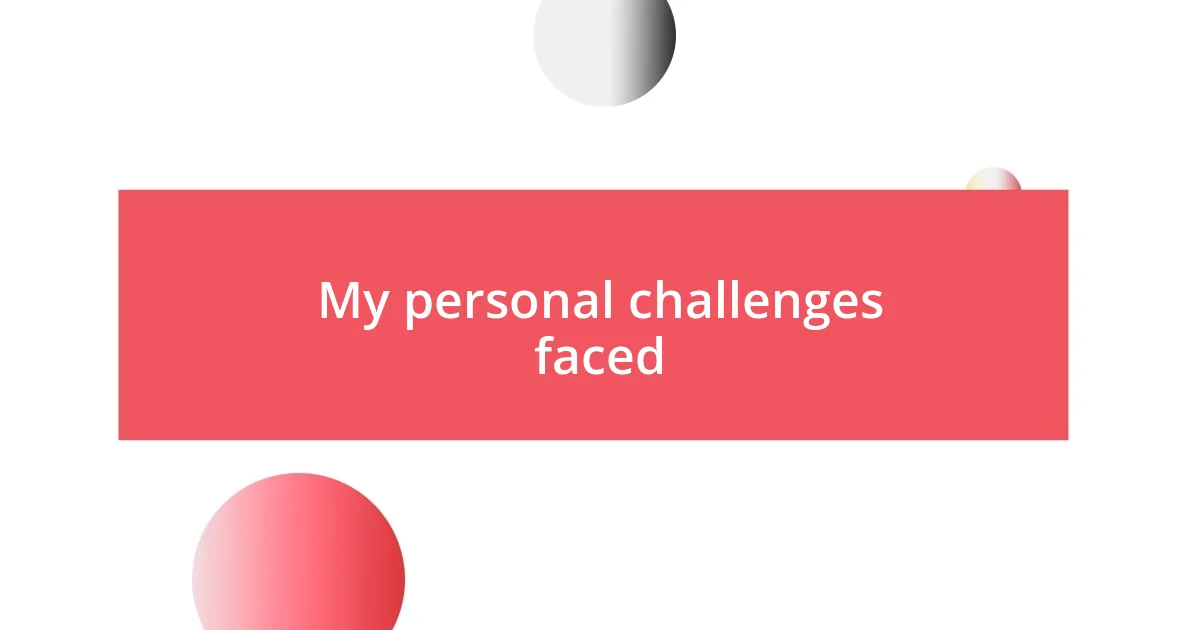
My personal challenges faced
There were days when I felt the weight of my commitments pressing down on me. I vividly remember one evening when I had to choose between attending a family gathering or finishing a project due the next day. That conflict left me feeling guilty, not fully present for either obligation. It was in those moments that I realized the importance of setting boundaries and communicating my needs, which can be so challenging to navigate.
As assignments piled up and deadlines loomed, anxiety became a familiar companion. I distinctly recall a particularly hectic week that left me staring blankly at my screen, feeling utterly lost. It’s disheartening when self-doubt creeps in, making me question whether I could manage it all. But finding ways to cope became essential. I started journaling my thoughts, which somehow made the challenges feel less daunting and helped me regain perspective. Have you ever tried writing down your feelings? It can really be a game-changer.
One of the biggest challenges was adjusting to a new rhythm of learning. Initially, I struggled with the freedom that flexible scheduling provided. I often found myself overcommitting, thinking I could tackle too much in a single day. There were evenings when I found myself overwhelmed, sitting with my textbooks but unable to focus. That realization pushed me to develop a more realistic approach—embracing the idea that it’s perfectly okay to say no sometimes, allowing me to honor my time and mental space.
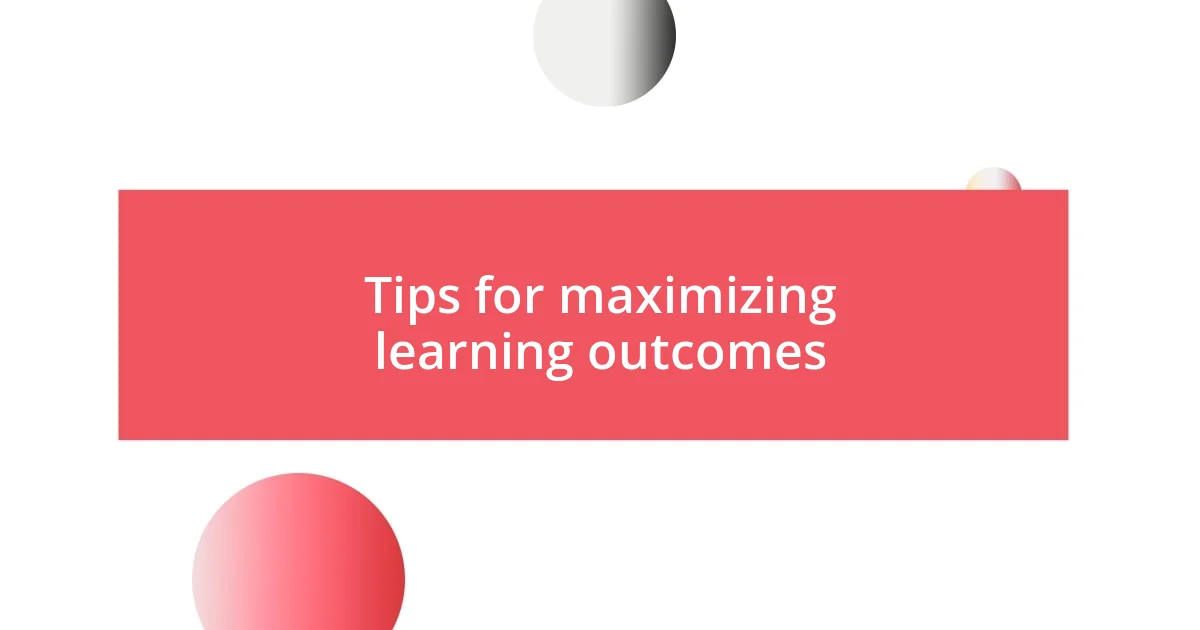
Tips for maximizing learning outcomes
One effective way to maximize learning outcomes is to create a personalized study schedule that aligns with your energy levels. I noticed that I was much more productive in the early mornings. By blocking off that time for focused study, I harnessed my peak hours—something that made a tangible difference in my retention of information. How do you align your study sessions with your natural rhythms? It’s a simple shift that can lead to profound advancements in your learning!
Another tip is to actively engage with your course material, rather than just passively absorbing it. I’ve found that discussing concepts with classmates or even teaching the material to someone else solidifies my understanding. Remember that time I formed a small study group? We couldn’t help but dive into deep discussions about our topics, which turned what could have been a chore into an exciting learning experience. What do you think—could sharing your knowledge with others enhance your grasp of the content?
Lastly, don’t underestimate the power of taking breaks. I realized that when I pushed through long study sessions without pausing, my focus would fade, and retention dropped. Incorporating short, intentional breaks allowed my mind to recharge, and sometimes, I would return with new insights. It’s almost like letting your brain process while you step away—have you tried this method? You could be surprised by the clarity that comes with a little distance from the material.










